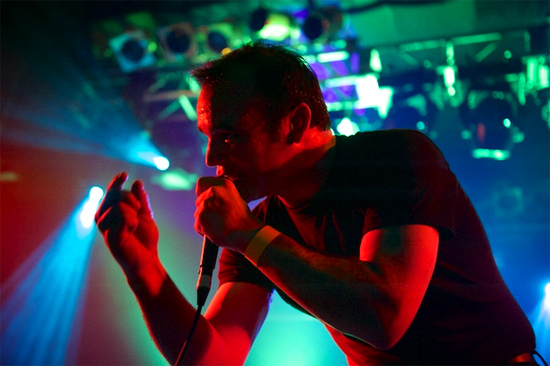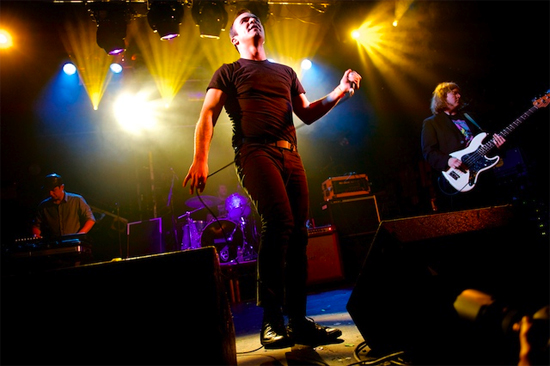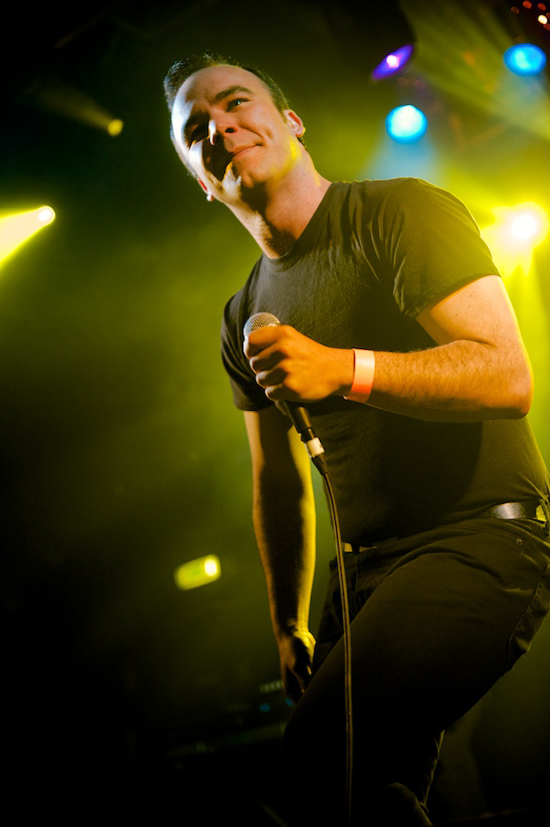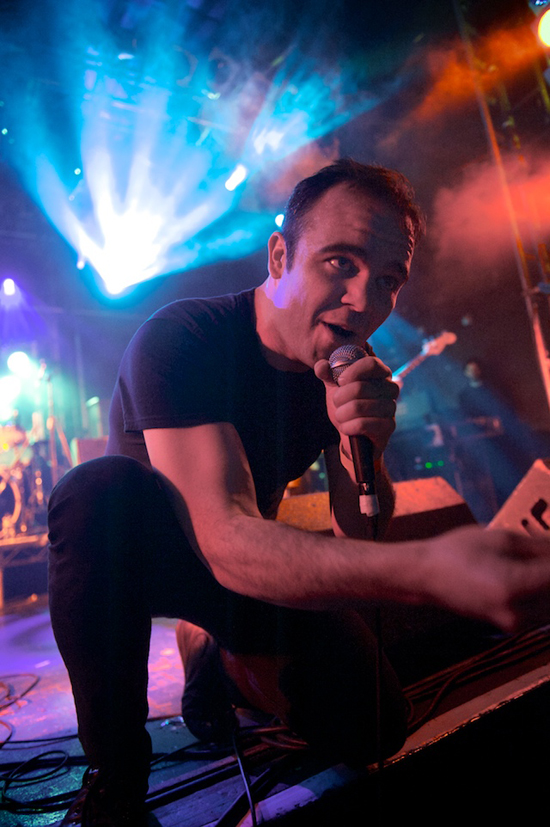Photos by Valerio Berdini
At Future Islands minus 90, two huge queues – one civilian, one industry – are already stretching serpentine along the cobbles of Brighton’s wind-whipped promenade. When The Great Escape festival originally booked the Baltimore band, and scheduled them in Digital (an arch under the beachfront that used to be the legendary Zap Club), the organisers had no reason to think that they’d be able to fill the venue five times over.
At Future Islands minus 45, many disheartened souls, still no closer to the velvet rope outside Digital, have given up and drifted away. Among the hundreds who remain, and hundreds more who’ve joined them, transatlantic friendships are formed in the surf and spray, bonded by this test of endurance.
At Future Islands minus one, shamelessly using my evil VIP queue-jump card for the first and only time all weekend, I finally get the nod and, with major guilt about the sorrowful faces on the thousands still locked out, gallop indoors just in time to hear Samuel T. Herring finish his introductory salutations with "…OK, let’s play some god damn music."
Something, clearly, is happening here. Or, to be accurate, something has happened. Future Islands – a synthpop quartet who have been knocking around since 2006, first on Thrill Jockey and now on 4AD – are a classic example of a band who, to coin a cliche, have taken eight years to become an overnight sensation. They look set to become indie pop’s biggest sleeper success since Pulp. And their Fairy Godmother was an unknown booker on an American talk show.
A sign of how rapidly the Future Islands phenomenon took off is that I encountered the backlash before the frontlash, seeing them mentioned on March 8th this year on the Facebook wall of a friend who didn’t get what all the fuss was about. Intrigued, I investigated the YouTube clip he’d posted. I got what all the fuss was about.
On 3rd March, Future Islands got the biggest break of their career – a live slot on the Late Show With David Letterman – and grabbed it like a cliff faller would a branch. They were preceded in the running order by Brendan Marrocco, a former US Army sergeant who had lost all his limbs in Iraq in 2009 when his vehicle was struck by a roadside bomb. They wondered, understandably, how they hell they were meant to follow that. But, oh boy, they followed it.
What happened next became an international Water Cooler Moment (or, as we ought to say in a colder climate like ours, Kettle Moment). Now, I bristle against this set of circumstances immediately, partly because journalistic vanity means that I don’t like it when something is already a ‘thing’ without me being an early adopter (god damn it, I’m on all the mailing lists, I diligently follow up promising word-of-mouth tips, how did a band like this get to their fourth album without me even hearing about them?), and partly because I resent the way that we in the UK are expected to accept these Big Moments on American shows we don’t even get over here (on terrestrial TV in any case) as being more significant than any other moment in a band’s career. Then I got over myself and watched the bloody thing and… well, frankly it was fucking amazing in all kinds of unexpected ways (and it was chiefly its unexpectedness which was most amazing of all).
As a rule, I’m at the extreme end of the scepticism spectrum when it comes to the idea of Authenticity in pop. I’m usually a hardliner who believes that everyone is faking it (indeed, Faking It: The Quest For Authenticity In Popular Music by Hugh Barker & Yuval Taylor is my go-to text on these matters), and that the moment you solidify your emotions into rhyming couplets and take them into the studio for a dozen different takes, you’ve severed the umbilical cord between the feelings you had in the first place and the form of expression you’ve chosen for them (i.e. a song). I’m also someone who believes that what we take to be Soul in a singer usually consists of a handful of codified vocal mannerisms and facial tics, which are understood by the listener to signify ‘meaning it’, even though they are by no means proof of the ‘it’ being meant. (Far from it, in fact.) But there’s always this slight window ajar in my wall of certainty, and once in a while, something comes along which pushes it open. Future Islands on Letterman didn’t bother with such niceties, and kicked the glass into tiny shards.
You had this guy, balding and wearing bad clothes, not looking like a rock star so much as a hard-working diner proprietor from The Sopranos. You had this song, ‘Seasons (Waiting On You)’, which sounded to my ears like a cross between ‘Dancing In The Dark’ by Bruce Springsteen and ‘Brilliant Mind’ by Furniture. You had this voice, which flitted unpredictably between the aforementioned white soul mannerisms and an incongruous, almost comical death metal growl. And most of all, you had this performance, this EXTRAORDINARY performance, this life-or-death, my-moment-is-now performance. Beating his chest like King Kong, taking haymaker swings at thin air, giving a display of dad-dancing the like of which hasn’t been seen since the heyday of Orchestral Manoeuvres In The Dark, gesticulating to communicate every point to the imaginary gig front row in his head, one by one (when all he could actually see, surely, were black rubber cables and chalk marks, and a small studio audience in the middle-distance), a glint of destiny in his blue eyes. At the end, Letterman – always a genial and polite host but not always, shall we say, engaged with the bands his bookers have hired – was visibly overcome with glee, congratulating Herring with the words "Oh buddy, come on!" and "I’ll take all of that ya got!"

The music was fine enough, if not exactly groundbreaking. Future Islands once came up with the jokey non-genre ‘post-wave’ to deflect any attempts to shoehorn them into an existing scene or movement, but it’s essentially standard synth-led indie pop (albeit executed with class and panache). Some reviewers have mentioned The Postal Service, though John Doran’s comparison with Joy Division is closer to the mark. But it was Samuel Herring’s delivery which really stopped you in your tracks.
What appealed to me most was its sheer UNCOOLNESS. It pushed all the buttons of the Dexys Mk II fan in me. And obviously, I more than anyone was aware that his apparent sincerity could all be a calculated charade, but somehow – like Spooky Agent Mulder in The X Files – I wanted to believe. I wanted to imagine that Future Islands Guy was some sort of borderline Care In The Community savant, a cross between Susan Boyle and Andrew WK (please do not, even for a moment, picture that tryst). In reality, it turns out that Herring is no naif, and is arch enough, for example, to have a side career as a rapper with the handle Hemlock Ernst (a pretty damn nifty one, at that). But this fact detracts from the sincerity of his performance not one iota.
It’s not even as if I’m immune to being wowed by a bit of ‘cool’ (in the sunglasses-at-night sense of a certain aloof restraint). In fact, I love it. But when something like this – something so intensely, palpably 4 REAL – comes along, it has the power to blast all that stuff away with embarrassing ease.
Even as these thoughts raced through my mind, I knew there was every chance that I’d dig into the Future Islands back catalogue and it would turn out to be crap. (I have, since. It isn’t.) Or that they’d let us down in some way, and do it fast. (They haven’t, as yet.) But you know what? If I was a singer in a band, I’d love to think I’d be giving it everything THIS guy was giving it.
And the shivers I got from watching this were a reminder that pop is an arena where alchemy can take place, where the ordinary can be transformed into the outlandish, and where the outlandish can in turn be transformative to those living hitherto ordinary lives. Future Islands had confused me. They laid down a challenge. What the hell was going on here? It made me uncomfortable. In all honesty, I couldn’t even tell if I liked it, at first. But whenever a band comes along and I don’t quite know what to make of them, it’s invariably but a short and fast leap to deciding that I DO like it. The confusion is a positive in itself. I’m a serial benefit-of-the-doubt giver, ever since the age of 16, when my initial reaction of repulsion upon seeing The Smiths on television, and irritation upon reading about them in Smash Hits, became reversed, and I became the world’s biggest fan. Nobody knows anything, least of all about themselves.
Before cynicism and caution kicked back in, I typed up my thoughts about Future Islands and posted it on Facebook. The ensuing debate was fascinating. My friends list, inevitably, is filled with other music journalists, who all made useful contributions. The Guardian‘s Alexis Petridis compared it, quite correctly, to the "disruptive" pop moment when the Associates first appeared on Top Of The Pops. His colleague Dave Simpson spoke approvingly – and, I submit, unimprovably – of Samuel Herring’s "man-on-firing-range dancing", while David Stubbs reckoned he "bobs and weaves… like a soul Rocky Marciano". David Bennun, meanwhile, opined that "This guy’s locking in to a… tradition that comes from R&B performers schooled in gospel. He’s testifying."
There were negative comparisons, too. Many people mentioned Shaun Williamson (Barry from EastEnders), and specifically his turn on Stars In Their Eyes. Others mentioned the dad from Happiness, or simply "an accountant". This pattern of bunking, debunking and rebunking was repeated in the wider world, with Twitter and the blogosphere going into meltdown with pro- and anti-Future Islands factions doing battle. Within a week, the big, grown-up newspapers had all waded in too, with think pieces along the lines of "What does Future Islands on Letterman tell US about US?"
Here’s what Future Islands on Letterman tells us about us. It tells us that, no matter your age, the Damascus moment is possible. It tells us that Richey Edwards was wrong: there is always redemption. It tells us that pop is still where magic happens.

And, for 45 minutes, Brighton Digital is where magic happens. Within the first ten seconds of ‘Inch Of Dust’, Samuel Herring scrolls through all his trademark moves – slapping himself in the heart, growling like he’s in Slipknot, dancing like he’s doing the Olympic slalom – and is generally so uber-himself that it’s almost camp. You have to laugh: yep, that’s the guy from the Letterman show, alright.
The sheer physicality of Samuel Herring’s performance is a sight to behold. For a start, his biceps look like they were forged from hard manual graft, not ‘roids and an expensive gym, and there’s something of The Incredible Hulk (mid-change) about his barely-contained rage/lust/pain, a similarity emphasised by the green spotlight which bathes him for the first song or two.
You wonder whether he’s ever studied mime of the Marcel Marceau/Alternative Car Park school, so expressive are his moves. More likely, he’s just freestyling it. Either way, during ‘Before The Bridge’ he punches himself in the head and blows spores from an imaginary dandelion, and during ‘Tin Man’ (and, by the way, if you’re looking for a Future Islands song to match ‘Seasons’, ‘Tin Man’ should be your first port of call), he pretends to peel his own face back from his skull, horror movie style.
He delivers ‘A Dream Of You And Me’ directly to the spotlight, working himself up to the brink of tears. I remember what he told The Quietus back in 2010: "I feel like that even with the way singers have performed in the 50s, 60s, 70s, 80s, there were great soul singers and really over the top pop performers… these passionate singers… where are they. Some people say I sing with my soul but how else can you sing? That is how someone should sing." And, fleetingly, I think to myself: imagine if this is what Emo meant.
The idea of juxtaposing a breathing, bleeding human against glacial, robotic synthesizers is nothing new, of course: in the 1980s it was practically a sub-genre in itself. In the past, though, the human has generally been either an effeminate male or a ballsy diva. What makes Future Islands tick is the fact that Herring is self-evidently a "real man" (whatever that means), a salt-of-the-earth Ordinary Joe desperately striving to reach across the singer-audience divide and convey his feelings.
‘Seasons’ is, inevitably, a MOMENT, and the forest of outstretched palms, all seeking a quasi-Papal laying on of hands from Herring, brings it home that you’re not the only one who was touched by that TV clip, not the only one who craves something that tastes as though it’s made from distilled emotions. He deflects any latent ‘messiah’ status with trivial chit-chat (Brighton, he says, reminds him of the coastal towns of his native North Carolina because it shares "the same style of choppy waves"), corny dance instructions (he wants us to "get on down" to FI’s "old school jams"), and at one point – alarmingly – some ‘sexy’ hip gyrations.
Nevertheless, there’s a tense moment during ‘Spirit’ when someone bats a yellow balloon towards the stage. How will this sweat-drenched and deadly-serious frontman react? Whaddayaknow, he breaks into the cutest smile. "You guys are lucky I’m not Morrissey", he says afterwards (and he’s righter about that than he’ll ever be about anything). "I’d cancel the show right now…"
We won’t let them go home. Bucking the conveyor-belt format of festivals like this one, the band return for an encore (‘Fall From Grace’, the night’s first and only ballad, conjuring the elegiac beauty of prime Cure or New Order). As we reluctantly file out into the Beaufort Scale-busting Brighton air, dazed "That just happened" expressions are all around.
I still worry about what’ll happen next, and whether Future Islands concerts will lose a little something when they have to play larger and larger venues to accommodate their new-found mass audience, and whether Samuel’s sincerity – if it isn’t a shtick already – will become one, in the light of exposure and repetition.
Somehow, though, I’ve got a sneaking faith that they can carry it off. And in pop, the present moment is all that matters, and the present moment, when Future Islands are onstage, playing at full pelt and close enough to touch, is beyond euphoric. For now, like Letterman, I’ll take all of that ya got.



